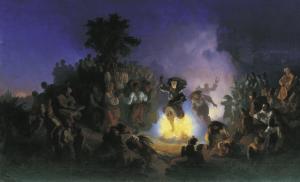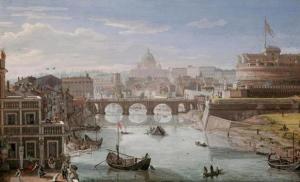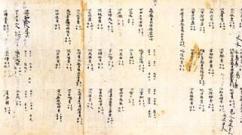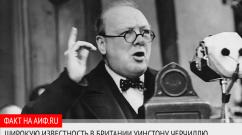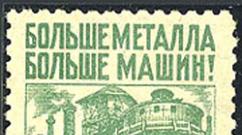What Sonya's golden pen looks like. Sonka the Goldhand
L the legendary Sonya - the Golden Pen a hundred years ago was famous in the underworld.
Her full name and surname is Sofia Ivanovna (Sheindlya-Sura Leibovna) Bluvshtein (nee Solomoniak). She was born far from the Neva coast, but the first "glory" came to her in our city.
Her biography is extremely confused, since she largely falsified her own biography.
According to official court documents, Sonya was born in the town of Powazki, Warsaw province, in 1846. However, when baptized Orthodox rite in 1899, she indicated the city of Warsaw, 1851, as the place and date of birth.
Received an education (according to other sources, she did not receive it at all and learned everything herself), knew several foreign languages. She had the gift of artistry and theatrical transformation.
Having escaped from her stepmother at the age of twelve, the smart and pretty Sonya fell into the service of the famous actress Yulia Pastrana. At the same time, her childhood years were spent among merchants and buyers of stolen goods - usurers, speculators and smugglers. At a young age, she "bombed" trains.
Among the surnames she used throughout her life were Rosenbad, Rubinstein, Shkolnik and Briner (or Brener) - the surnames of her husbands. She was married several times, the last official husband was a card cheat Mikhail (Mikhel) Yakovlevich Bluvshtein, from whom she had two daughters.
She was involved in the organization of large-scale thefts, gaining fame in the criminal world due to her adventurous component, her penchant for mystification, theatrical change of appearance and the talent to get "dry" out of the most "wet" situations. Even abroad, she was repeatedly detained, but always released and often with apologies.
According to contemporaries, she was a charming woman, but at the same time she did not shine with beauty. She had an extraordinary inner charm that was impossible to resist.
The aristocrats not only of the Russian Empire, but also of many countries of Europe, without the slightest hesitation, mistook her for a lady of their circle. That is why she could freely travel abroad, where she presented herself either as a viscountess, or a baroness, or even a countess. At the same time, no one doubted her belonging to high society.
A prison photo of the real Sonya, the Golden Pen, has been preserved, as well as police orientations, according to which they were looking for a criminal. They described a woman who had a height of 1m 53 cm, with a pockmarked face, a wart on right cheek and moderate nose with wide nostrils. She was a brunette with curly hair on her forehead, from under which mobile eyes looked out. She usually spoke boldly and arrogantly. Sonya never started a new scam without considering the possible development of the situation in advance.
In St. Petersburg, the Golden Pen invented a new method of hotel theft, which later became very popular. It was called as a radio program - "Good morning!" and consisted of the following: elegantly dressed Sonya stayed in one of the best hotels, carefully studied the plans of the rooms, looked at the guests, and then in the early morning, putting on soft slippers, entered the victim’s room and took money and jewelry.
If the guest suddenly woke up, he found in his chambers a smartly dressed lady in expensive jewelry. She, pretending not to notice anyone, began to slowly undress. At the same time, the owner had the impression that the woman mistakenly took his apartment for hers. In the end, the thief masterfully portrayed horror, shame and embarrassment and blushed sweetly apologetically, and easily charmed the rich dupe. She sold the stolen jewelry to a friend, the jeweler Mikhailovsky, who remade and sold them.
Sonya acted brazenly, successfully, with ruthless professionalism, but she was not alien to compassion. Entering one day at dawn into someone else's hotel room, Golden Hand was surprised to see a young man sleeping right in his clothes, next to whom lay a revolver and a letter to his mother. The young man wrote that he had spent the state 300 rubles and asked no one to blame for his death. According to legend, touched by Sonya, she took out a 500-ruble banknote from her reticule, put it next to the revolver and quietly left.
One day, she accidentally learned from a newspaper article that the woman she had robbed turned out to be a poor widow of a petty employee. As it turned out, the victim after the death of her husband received an allowance in the amount of 5 thousand rubles. As soon as Sophia recognized her victim in her, she immediately went to the post office and sent the poor woman a larger amount than was stolen. In addition, she accompanied her transfer with a letter in which she apologized for her act and advised her to better hide the money.
In 1880, in Odessa for a major fraud, Sonya was arrested and transferred to Moscow. After a trial in the Moscow district court on December 10-19 of the same year, she was exiled to a settlement in the most remote places of Siberia. The deaf village of Luzhki in the Irkutsk province was determined as the place of exile. In the summer of 1881, she escaped from her place of exile.
Prior to her arrest in 1885, she committed a number of major property crimes in the provincial cities of Russia. In 1885, in Smolensk, she was captured by the police. For major theft and fraud, she was sentenced to 3 years of hard labor (hard labor was served at the discretion of the court in hard labor prisons on the territory of the European part of the Russian Empire until 1893) and 50 lashes. On June 30, 1886, she escaped from the Smolensk prison, using the services of a warden in love with her.
They say she had very beautiful eyes - wonderful, infinitely pretty, velvety, which "spoke" in such a way that they could lie perfectly well.
After four months of “freedom”, she was arrested in the city of Nizhny Novgorod, and now she was again convicted for escaping from hard labor and new crimes, and sent in 1888 from Odessa by steamer to hard labor in the post of Aleksandrovsky Tymovsky District on Sakhalin Island (now Aleksandrovsk-Sakhalinsky, Sakhalin Region), where, after two escape attempts, she was shackled.
Shackling "Sonya the Golden Hand" into shackles, 1888
In total, she made three attempts to escape from Sakhalin penal servitude, for which she was subjected to corporal punishment by the decision of the prison administration.
In 1890, Anton Chekhov met her, who left a description of the convict Sofya Blyuvshtein in the book "Sakhalin Island":
“This is a small, thin, already graying woman with a wrinkled, old woman's face. She has shackles on her hands: on the bunk there is only a fur coat made of gray sheepskin, which serves her both as warm clothes and a bed. She walks around her cell from corner to corner, and it seems that she is constantly sniffing the air, like a mouse in a mousetrap, and her expression is mouse-like. Looking at her, one cannot believe that until recently she was beautiful to such an extent that she charmed her jailers ... "
But the famous "old woman"-convict at that time was only 40 years old.
Sonya's Golden Pen signature.
After her release in 1898, Sonya Zolotaya Ruchka remained in a settlement in the city of Iman (now the city of Dalnerechensk) in the Primorsky Territory. But already in 1899 she left for Khabarovsk, and then returned to Sakhalin Island to the Alexandrovsky post.
In July 1899, she was baptized according to the Orthodox rite, named Maria. Priest Alexei Kukolnikov performed the rite of the sacrament over Sonya.
About 5 million rubles - about the same amount the famous adventurer earned on her frauds (known to the police). But in real life, of course, much more.
At the beginning of the 20th century, versions were circulated about her successful escape and about a figurehead who served hard labor for her. Already in Soviet times, the aged Sonya the Golden Hand was allegedly seen either in Odessa or in Moscow.
It is known about three daughters of Sophia Blueshtein:
Sura-Rivka Isaakovna (nee Rosenbad) (born 1865) - abandoned by her mother, remained in the care of her father, Isaac Rosenbad, in the town of Powazki, Warsaw province, fate is unknown.
Tabba Mikhailovna (née Bluvshtein) (born 1875) is an operetta actress in Moscow.
Mikhelina Mikhailovna (née Bluvshtein) (born 1879) is an operetta actress in Moscow.
Sofya Blyuvshtein died of a cold in 1902, as evidenced by a message from the prison authorities, and was buried at the local cemetery in the Aleksandrovsky post. Initially, the monument looked like this: a thin female figure carved from white marble stands under tall forged palm trees. In 2015, only the statue survived from the entire composition, and even that one with a broken head. It is not known for certain who is buried in this grave, but it is always decorated with fresh flowers and strewn with coins. In addition, the entire pedestal of the monument is literally dotted with inscriptions of a criminal nature. There is a strange belief that even after death Sonya helps and brings thieves' luck to those who ask for it...
Quotes by Sophia Blyuvshtein:
"My dear mommy ... I'm so lonely, it's so hard without you. Dad lives with a rude and uncouth Evdokia, who doesn't understand where it came from on our heads. For this redneck, the main thing is that dad steals more."
"I think He rewarded me ... I take risks. But this is the kind of life that drags me forward with such force that my head is spinning all the time."
"- What did you steal? - Gold, or what? - Not only, more diamonds. - This is not theft. Pampering. - What is theft? - Theft is when souls are stolen."
Recently in Russia there was a series about her. The portrait resemblance of the actress playing the main role is simply amazing.
The thieves' name Sonya the Golden Hand in the 20th century went to another criminal - Olga von Stein. In popular rumor, the crimes of these two thieves merged together. And the legendary collective image turned out ...
The basis of information and photos (C) SYL.ru, http://fb.ru/article, etc. The first photos (according to the owner) belong to Sonya and (most likely) to one of her husbands. (C) Sergeyich.
Life story - Sofya Blyuvshtein "Sonka the Golden Hand"Who should be a Jewess in Russia at the end of the century before last in order to become a universal favorite, so that before any television she was recognized by sight, so that the first domestic series of as many as eight silent episodes was filmed about her life, so that cards with her image were sold out on the fly, like newspapers, in which articles about her sometimes occupied more than one page? Talented thief.
The human imagination "Sonka - the golden pen" shocked in late XIX century. At the beginning of the 20th century, her thief's nickname (like the name of the English innkeeper Hooligan, who robbed and killed his guests) became a household name and existed in Russian colloquial language for a long time.
However, in the memory of the older generation, "Sonka - the golden pen" was not an extortionist and a talented liar, like Olga von Stein, but the Russian version of Professor Moriarty, a kind of queen of the underworld. According to legend, while in prison, she was able to connect her hands so skillfully that she freely removed her hand shackles.
There are also chronological inconsistencies. For example, Sonya's exploits occurred at the end of the 19th century, and Olga "worked" until 1912.The image of "Sonya - a golden pen" was created by rumor. It was the thief's nickname of Sofia Ivanovna Bluvshtein, a Jewish woman from Odessa, born in 1855.
Interesting memories of this lady were left by A.P. Chekhov, who visited Sakhalin Island in the summer of 1890. Then the most famous thief in Russia and Europe was imprisoned in solitary confinement in hand shackles. Before that, the Golden Pen was imprisoned in Smolensk, from where she managed to escape with the guard who was guarding her. Like all women exiled to Sakhalin, at first she lived outside the prison in a free apartment. Soon, disguised as a soldier, she escaped again with her partner, but was caught, shackled and placed in solitary confinement.
At the time when Sonya was at large, several daring crimes were committed in the Alexander Post - the murder of the shopkeeper Nikitin and the kidnapping of 56,000 rubles from a Jew - a settler Yurkovskiy, a huge amount at that time. Everyone knew that Sonya was hiding behind these crimes, but the investigators could not prove this fact. And in freedom, and on Sakhalin, a train of loud glory stretched for Sonya. It was said that she was able not only to professionally organize crimes, but also to hide their traces well.

Vlas Mikhailovich Doroshevich, a talented reporter of his time, wrote in more detail about "Sonya - the Golden Pen". He met her during his trip to Sakhalin in 1905, when Sofya Ivanovna was already living in a settlement with her roommate, the exiled settler Bogdanov. According to camp terminology, she was considered a "peasant from the exiles."
Doroshevich was looking forward to meeting Mephistopheles, Rocambole in a skirt, with a powerful criminal nature, which was not broken by hard labor, solitary confinement, or heavy hand shackles. She wore them for two years and eight months. Unlike Olga von Stein, who turned out to be a charming extortionist, Sofya Bluvshtein was the organizer of many unsolved robberies and murders.
And finally, the long-awaited meeting took place. Before the eyes of the famous journalist and reporter stood a small, fragile old woman with traces of a bygone youth, with a rouged, wrinkled face, like a baked apple, in an old hood. "Really," thought Doroshevich, "it was She?" All that remains of the former Sonya are soft, expressive eyes that could lie perfectly well. By her manner of speaking, she was a simple Odessa bourgeois woman, a shopkeeper who knew Yiddish and German. An excellent connoisseur of human characters, Doroshevich could not understand how her (Sonka's) victims could mistake the "Golden Pen" for a famous artist or an aristocratic widow?

The all-Russian, almost European celebrity Sonya was in the spotlight on Sakhalin as well. There were various legends about her. The opinion was stubbornly held that she was not real at all, but a "shifter" who was serving a sentence for the real Sonya, who continued her criminal "activities" in distant Russia. Even the Sakhalin officials, who learned that Doroshevich had seen and remembered photographs of the "Golden Pen", taken before the trial, asked him: "Well, is she? The one?" To which the journalist, who had an excellent professional memory, replied: "Yes, but only the remnants of that Sonya."
Her criminal nature did not give up, she stubbornly fought the hard labor regime of Sakhalin. She was flogged, and according to the terrible Sakhalin executioner Komlev, in the most cruel way. A local photographer organized a profitable business on Sonya, selling photographs of the Golden Pen. She was taken out to the prison yard, placed next to an anvil, a blacksmith with a hammer, guards and Sofya Blyuvshtein in hand shackles. Such photos were willingly bought by sailors from ships that came from the mainland, and then tourists. Sakhalin penal servitude treated the Golden Pen with respect. "Baba is the head," they said about her. In modern thieves' jargon, she would be called a "thief in law."

Sofia Blueshtein. Photo from Count Amaury's book. "Sonka the Goldhand"
"Golden Pen" is an old street nickname for a pickpocket of the highest qualification.
Sophia's roommate - Bogdanov - spoke about her to Doroshevich: "Now Sofya Ivanovna is sick and does not do anything." Officially, she brewed excellent kvass, built a carousel, organized an orchestra from the settlers, found a magician, staged performances, dances and festivities. And unofficially, she traded vodka, which was strictly prohibited on Sakhalin. And although this was widely known, no searches revealed the manufacturer of the "green serpent". Only empty bottles of kvass were found by law enforcement officers. She kept "raspberries", sold and bought stolen things, but the police could not detect the stolen goods.
Thus, she "fought for her life", dreaming of returning to Russia again. She bombarded the metropolitan reporter with questions about the city of her childhood - Odessa. During one of the meetings, Sonya told Doroshevich that she had two daughters left in Odessa, who performed as pages in the operetta. She begged to be informed of their fate, as she had not received any news from them for a long time. As Doroshevich wrote about this story, "Rocambole was no more in a skirt." An old woman, the mother of her unfortunate children, about whose fate she had known nothing for a long time, sobbed in front of the capital's reporter.
This is the end of the story of the true "Sonya - the Golden Pen" - Sofya Ivanovna Blyuvshtein. Considering the testimony of two independent highly authoritative informants - A.P. Chekhov and V.M. Doroshevich, one can understand how two different people turned out to be united into one person - Olga von Stein and Sofia Ivanovna Bluvshtein. At the end of the 19th - beginning of the 20th century, "Sonka - the golden pen" became a symbol of the superstar of the criminal world. At a time when the real Sophia was serving a link to Sakhalin, her name hovered around the cities and towns of Russia. It is quite natural that another adventuress, Olga von Stein, inherited the famous thief's nickname.
Sources - The X-Files of the 20th Century, 2001, http://tonnel.ru/?l=gzl&uid=450, http://www.gzt.ru/http://a-pesni.golosa.info/
P.S.
In the mid-nineties, a number of mysterious robberies swept across Europe. And the prime suspect was a woman. The handwriting and description of the criminal resembled our heroine. The criminal was not caught. Again, everything pointed to the handwriting of the Golden Pen. But she was in prison, after all.
The last years of her life, as the legend says, the Golden Pen lived with her daughters in Moscow. Although they were ashamed in every possible way of the scandalous popularity of their mother. Old age and health undermined by hard labor did not allow him to actively engage in the old thieves' profession. But the Moscow police faced strange and mysterious robberies. A small monkey appeared in the city, which in jewelry stores jumped on a visitor picking up a ring or a diamond for herself, swallowed a valuable item and ran away. Sonya brought this monkey from Odessa.
The legend says that Sonya the Golden Hand died at an advanced age. She was buried in Moscow at the Vagankovsky cemetery, plot No. 1. After her death, according to legendyes, with the money of Odessa, Neapolitan and London swindlers, a monument was ordered from Milanese architects and delivered to Russia.

What was worth one poem by the Odessa raider Volodya Kochubchik, dedicated to the star friend and read by him with an expression at the court session:
You were even born a gypsy
Swarthy hands and face,
But you before the Italian
There is no comparison in anything.
There is no love dearer than yours
Everyone turns pale before her,
And only one I, meaner than all,
I laugh at her like crazy.
Sonya the Golden Handle (Sofya Ivanovna Bluvshtein) is the madonna of the criminal world, whose name is surrounded by the most amazing legends; so much so that now hardly anyone can know for sure where is the truth and where is fiction. The grave at the Vagankovsky cemetery (1 account) in Moscow, where, according to legend, the great adventurer was secretly buried, is a place of pilgrimage for people with a criminal present. The monument is covered with admiring admirers of her talent.
What a pity that no photographs have been preserved, of which one could say with complete certainty that Sonya herself is depicted on it. But this is her monument, though someone managed to behead him .....
Biography
There is no exact information about the life of Sophia (Sonya) Solomoniak-Bluvshtein-Stendel, since she largely falsified her own biography. According to official court documents, the famous adventurer was born in the town of Powazki, Warsaw province in 1846. However, when baptized according to the Orthodox rite in 1899, she indicated the place and date of birth in Warsaw, 1851. She was educated and knew several foreign languages. She had the gift of artistry and theatrical transformation.
She was married several times, the last official husband was the card cheat Mikhail (Mikhel) Yakovlevich Bluvshtein, from whom she had two daughters. She was involved in the organization of large-scale thefts, which gained fame due to the adventurous component, the tendency to hoax and theatrical change in the appearance of a swindler. Among the surnames she used throughout her life were Rosenbad, Rubinstein, Shkolnik and Briner (or Brener) - the surnames of her husbands.
In the 1860s and 70s, she was engaged in criminal activities in large Russian cities and in Europe.
Repeatedly detained by the police of different states, but without serious consequences.
| This is a small, thin, already graying woman with a wrinkled, old woman's face. She has shackles on her hands: on the bunk there is only a fur coat made of gray sheepskin, which serves her both as warm clothes and a bed. She walks around her cell from corner to corner, and she seems to be sniffing the air all the time, like a mouse in a mousetrap, and her expression is mouse-like. Looking at her, one cannot believe that until recently she was beautiful to such an extent that she charmed her jailers ... |
Shackling Sonya Golden Pen in shackles, 1881
After World War II, the grave was lost.
Children
It is known about three daughters of Sophia Blueshtein:
- Sura-Rivka Isaakovna (nee Rosenbad) (born 1865) - abandoned by her mother, remained in the care of her father, Isaac Rosenbad, in the town of Powazki, Warsaw province, fate is unknown.
- Sofia Mikhailovna (née Bluvshtein) (born 1875) is an operetta actress in Moscow.
- Antonina Mikhailovna (née Bluvshtein) (born 1879) is an operetta actress in Moscow.
In art
- - silent film "Sonka the Golden Hand" (original title "The Adventures of the famous adventurer Sofia Blueshtein") directed by Vladimir Kasyanov and Yuri Yuryevsky. The role of Sophia Blyuvshtein was played by Nina Gofman. The film survived without inscriptions. The negative is stored in
"Sonka - the Golden Pen" - a woman who went down in history, becoming famous for her very dubious talent. It is difficult not to be surprised at the ease with which this small and very charming person could take serious men, law enforcement officers and prison officers.
Films are being made about her and her talents to this day, interesting books are being written. The nickname "Sonka - the Golden Pen", which Sofya Ivanovna Bluvshtein had, spoke for itself.
The great swindler of Russia - "Sonka - the Golden Pen"
In the second half of the nineteenth century, Russia stood in the forefront among the most prosperous and richest powers in the world. Every eighth inhabitant of the planet knew the Russian language. There were external enemies, from which a reliable guard defended on the border of an endless state. Internal enemies were revolutionaries - terrorists and various kinds of criminal elements that harm civilians.
It was such a prominent representative of this community that a woman named Sofya Blyuvshtein was. She was the most famous among the representatives of the underworld of Tsarist Russia. All printed publications told about the thieves' adventures of the legendary criminal. Interesting stories passed from generation to generation. It was impossible to buy a postcard with her image. When silent films appeared on the screens, the main character of many films was Sonya.
Sofia Ivanovna Bluvshtein: biography
"Sonya - the Golden Pen" was far from the beauty. Here are the descriptions preserved in the documents (quote): “Thin in appearance, 1 meter 53 cm tall, pockmarked face, moderate nose with wide nostrils, a wart on the right cheek, curly hair, blond, brown eyes, mobile, too bold, talkative” . Sophia Blyuvshtein was like that at that time, whose biography has been preserved unreliable.
Sophia Solomoniak - Blueshtein - Stendel did not describe her life exactly, which is why it is impossible to find information about her birth anywhere. Official court documents have records that the adventurer was born in 1846 in the Warsaw province, in the town of Powazki. She was baptized in 1899. She was educated and could speak several foreign languages fluently.
Sophia got married more than once. Her last husband, Mikhail Yakovlevich Bluvshtein, was an avid card player. Among all the names she used were: Rubinstein, Rosenbad, Shkolnik and Brener.
In the sixties and seventies, this woman was engaged in theft in the cities of Russia and Europe. In 1880 Sonya was again arrested for fraud. She was brought to Moscow. The Moscow court decided to exile her to the Irkutsk region, to the remote village of Luzhki. She fled from there in 1881.
In 1885, another arrest followed in Smolensk for theft of property on an especially large scale and a sentence to three years of hard labor in prisons in the European part of Russia. And already on June 30, the criminal escaped from the Smolensk prison. In 1888, she was serving another sentence in the post of Alexander.

Chekhov's meeting with Sofia Bluvshtein took place in 1890. He described her this way in his book: “... Thin, small, with gray hair and a badly wrinkled face. On the hands are shackles. On the bunk lay a fur coat made of gray sheepskin, which served as clothing and at the same time was a bed. She walked and seemed to sniff the air all the time, like a mouse in a mousetrap. Looking at her, it was hard to believe that so recently she was famous for her beauty ... "
In 1898, "Sonka - the Golden Pen", having freed herself, left for Khabarovsk. In July 1899, after being baptized according to the Orthodox rite, she acquired the name Maria.
Sofia Ivanovna Bluvshtein: children
The only thing known about the children of this lady is that she has three of them. The first Sura-Rivka Isaakovna was born in 1865. Her mother left her, father Isaac Rosenbad, who lived in the Warsaw province of Powazki, took care of her. How the fate of the child developed in the future is unknown.
Tabba Mikhailovna, the second daughter, (named Bluvshtein) was born in 1875. She became an operetta actress in Moscow.
Bluvshtein Mikhelina Mikhailovna is Sophia's third daughter. Year of birth - 1879, also an actress of the Moscow operetta.
Criminal Talent
Sonya did not waste herself on trifles. For each new conceived business, she prepared diligently, trying to foresee all the surprises, weighing everything to the smallest detail. For a clever swindler, there were no state borders or high fences. The young woman knew how to strike up a conversation with dexterity, she was accepted into society everywhere.

The brave thief, after every successful business, liked to relax in Marienbad, imagining herself as a baroness. Sonya has always preferred to remain an aristocrat in the criminal world. Her lovers were Peter's prominent swindlers.
She loved to “work” alone, sometimes she took assistants for herself, even created her own gang and became a member of a club of criminals called “Jacks of Hearts”.
Quotes by Sofia Blueshtein
The famous director wrote a wonderful book, which very interestingly describes the life story of "Sonya - the Golden Handle."
Below are quotes from Sophia Blueshtein.
“My dear mother... I am so lonely, so hard without you. Papa lives with the rude and uncouth Evdokia, who, it is not clear where it came from on our heads. For this redneck, the main thing is that dad steals more.
“I think He rewarded me… I take risks. But this is the life that drags me forward with such force that my head is spinning all the time.
And the most important saying is known to many.
What did you steal?
Gold, right?
Not only, more diamonds.
This is not theft. Pampering.
What is theft?
Theft is when souls are stolen.
The last years of the life of "Sonya - the Golden Handle"
As they say, in last years life Sofya Blyuvshtein was in Moscow with her daughters, although they were ashamed of their unlucky mother. She could not practice her old thieves' trade, as her health was undermined by hard labor.
But there was such a case when the Moscow police discovered rather strange robberies. In jewelry stores, the monkey snatched rings or diamonds from the hands of visitors and ran away. It was predicted that the famous Sonya brought the monkey from Odessa.
When exactly Sophia died is unknown. There are only legends. According to one version, she lived in Odessa until old age and died there in 1947, according to another, she died in 1920 in Moscow and was buried there.
There are other inaccurate data: she lived in Primorye until her death, and they also say that representatives of the criminal world brought her body to Moscow and buried it at the Vagankovsky cemetery.
No one really knows what really happened. Of course, it is clear that Sofya Blyuvshtein definitely ended her life, but "Sonka - the Golden Pen" lives on the planet in our century.
The power of the monument to Sophia Blyuvshtein
What in Moscow is the grave of the legendary thief - the swindler "Sonya - the Golden Pen". It is made of marble in the form of a sculpture - a woman without arms and a head. Time made itself felt: the marble cracked, the fence was torn to pieces.
There is a belief that Sonya even after death helps those who ask for it. Near the grave is always crowded, thieves come, young girls visit with the hope of finding help. Good work, and others - just on a tour.
The folds of the dress, made of stone, are covered with black marker: “Darling Sonya, help me get rich”, “I really want money”, “Help me get well, become happy” and many others. At the foot of the monument - fresh flowers.

Sonya's life was strange, everything seemed to go the other way around in her. She became an actress not on stage, as she dreamed, but in carriages, love did not exalt, but pulled to the bottom. You can end the recollection of "Sonka - the Golden Pen" with the following words: Sofya Bluvshtein was and remains a model of what Jews can give to the criminal scene.
How was the fate of the children of Sonya the golden pen?
- Romantic! Respect!
- CHILDREN OF SOFIA BLUVSTEIN
The real name did not become known immediately, since Bluvshtein lived according to the documents of a certain Iosif Delfinov, and was called the Bronze Hand in the street. Some curious details soon emerged, for example, that he "was at the Golden Handle until the age of 16, and at present he is 25-27 years old." It turns out that Sonya became a mother around 1861 (at the age of 15 - author's note) ... “He was called the Bronze Hand by his comrades in the profession because,” writes a contemporary, “that he comes from the Golden Hand. His closest assistant was the Chisinau tradesman Hershko Mazurchuk, who lived in Odessa on a false passport.” At the same time, Bluvshtein Jr. was transferred to his homeland, to Warsaw, where a lot of things were listed behind him. His further fate is unknown to me ... ".
As for me, I tend to think that both Rachel-Mary and Mordoch Bluvshtein are not Sonya's children, but something from the series of "children of Lieutenant Schmidt." After all, our heroine married the grocer Isaac Rosenbad in 1864 and gave birth to a daughter, Sura-Rivka. And with the card cheater Michel Bluvshtein, she meets a few years later and gives birth to a daughter, Tabba. It turns out that if she had a son who was born in 1861, then, logically, his surname should not be Blueshtein. In addition, already being in hard labor, in 1897 Sonya herself confesses to the writer Doroshevich that she has 2 daughters: “... I am already old, I can no longer ... I just would like to see the children. hail near the Golden Handle.
“I have two daughters. I don't even know if they are alive or not. I have no news from them. They are ashamed, perhaps, of such a mother, they have forgotten, or perhaps they have died ... What about them? I only know that they are in actresses. In operetta, in pages. Oh my God! Of course, if I were there, my daughters would never be actresses ... ".
It is not possible to find Sonya's children now, because, based on the average life expectancy of a person, they are no longer alive. But, for sure, there are grandchildren and great-grandchildren who may not know anything about their criminally famous grandmother.
